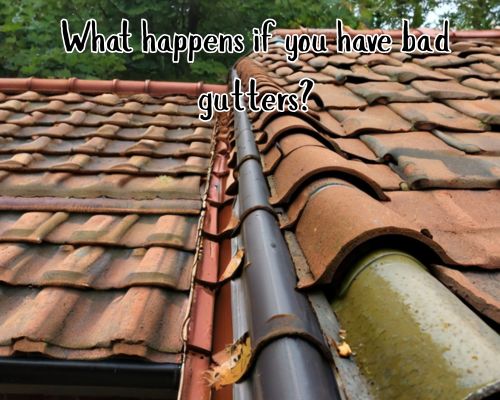
What Happens If You Have Bad Gutters? A Melbourne Homeowner’s Guide What Happens If You Have Bad Gutters? A Melbourne Homeowner’s Guide
If you own a home in Melbourne, Australia, you know that the weather can be as unpredictable as a kangaroo on a trampoline — one minute it’s sunny, the next it’s raining cats and dogs. That’s why having well-maintained gutters is crucial. But what happens if you have bad gutters? Spoiler alert: it’s not pretty. From structural damage to pest infestations, the consequences are serious and can hit your wallet hard. Let’s get into details with Gutter Cleaning Melbourne.

Understanding Gutters: The Unsung Heroes of Your Home
Gutters are the channels that collect and divert rainwater from your roof to the drainage system, protecting your home’s foundation, walls, and landscaping. Melbourne’s seasonal downpours make gutters a critical defense against water damage. When gutters are clogged, broken, or improperly installed, they fail to perform this vital role.
The Consequences of Bad Gutters in Melbourne’s Climate
1. Water Damage to Foundations and Walls
In Melbourne, the sudden heavy rains during winter can overwhelm faulty gutters. When gutters overflow, water spills over, pooling around the base of your home. This causes:
- Foundation erosion and cracks
- Damp and mold growth inside walls
- Crumbling bricks or render damage
According to local building experts, untreated water damage can cost thousands in repairs. Melbourne’s clay soil also expands and contracts with moisture, exacerbating foundation issues.
2. Roof Damage and Increased Maintenance Costs
Bad gutters cause water to back up onto your roof. The constant wetness can:
- Rot timber fascia boards
- Cause shingles or tiles to lift or decay
- Lead to moss and algae growth
These problems are especially relevant in Melbourne suburbs like St Kilda and Fitzroy, where older homes with traditional roofing styles are common. Roof repairs are expensive and often preventable with proper gutter maintenance.
3. Pest Infestations and Health Risks
Blocked gutters filled with stagnant water create a perfect breeding ground for mosquitoes and other insects. Melbourne’s temperate climate encourages these pests year-round. Additionally:
- Wet, decaying debris attracts rodents and birds
- Mould growth inside your home poses respiratory health risks
4. Landscaping and Property Damage
Overflowing gutters can erode garden beds, wash away mulch, and drown plants. For Melbourne homeowners invested in beautiful gardens, like those in Camberwell or Brighton, bad gutters threaten both curb appeal and property value.
Key Signs Your Melbourne Home Has Bad Gutters
To avoid the nightmare scenarios above, watch for these warning signs:
- Overflowing water during rain
- Peeling paint or water stains on walls
- Sagging or detached gutters
- Pools of water near the foundation
- Visible debris and blockages
How to Fix and Prevent Gutter Problems in Melbourne
Professional Gutter Cleaning and Maintenance
Melbourne’s leafy suburbs—think Kew or Balwyn—accumulate leaves, twigs, and dirt quickly. Regular cleaning, ideally twice a year before and after winter, prevents clogs and water damage.
Upgrade to Quality Materials
Modern materials like colorbond steel or aluminium gutters resist rust and are ideal for Melbourne’s variable weather. Choosing the right gutter style and size also improves water flow efficiency.
Install Gutter Guards
Gutter guards reduce debris buildup and cut down on maintenance. They’re a smart investment in suburbs with lots of trees, such as Eltham or Ivanhoe.
Check and Repair Promptly
Fix leaks, replace damaged sections, and ensure proper gutter pitch so water flows towards downpipes. Hiring a licensed plumber or roofing specialist in Melbourne guarantees quality repairs.
The Cost of Ignoring Bad Gutters in Melbourne
Ignoring gutter problems might save money now but expect to pay through the nose later. Common expenses linked to bad gutters include:
- Foundation repairs: $5,000 to $15,000+
- Roof repairs: $1,000 to $6,000
- Pest control and health remediation
- Landscaping restoration
Prevention and early intervention keep these costs manageable. For professional needs, go to Gutter Cleaning Melbourne.
Why Melbourne Homeowners Must Prioritize Gutter Health
Melbourne’s climate, with its wet winters and leafy suburbs, demands gutters that work perfectly. Good gutters protect your biggest investment — your home — while maintaining its aesthetic and resale value. Plus, well-maintained gutters help avoid unexpected headaches and costly repairs.
Conclusion: Don’t Let Bad Gutters Rain on Your Parade
So, what happens if you have bad gutters? From structural damage and roof decay to pest invasions and landscaping ruin, bad gutters in Melbourne spell trouble. The good news? With timely cleaning, maintenance, and smart upgrades, you can safeguard your home against these risks.
Stay ahead of the game — get your gutters inspected and cleaned regularly by Melbourne professionals. Your home will thank you with lasting protection and peace of mind.

